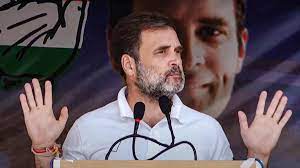Silent Resistance in Kashmir: Mehbooba Mufti Urges 15-Minute Blackout to Mark Article 370 Anniversary
By: Javid Amin | Srinagar | 05 Aug 2025
Marking six years since the abrogation of Article 370, former Jammu and Kashmir Chief Minister Mehbooba Mufti on Monday called for a 15-minute symbolic blackout to protest what she described as the “unilateral” revocation of the state’s special constitutional status by the Government of India.
The People’s Democratic Party (PDP) leader urged citizens to turn off their lights at 9:00 PM as a “collective moment of silence and remembrance.”
“Let the silence speak. Let the darkness remind the world of what was lost and what still lives in us,” Mufti said in a heartfelt message shared on social media.
Darkness Across the Valley: Symbolic Protest Gains Traction
Despite tight security and heightened surveillance, the blackout saw widespread participation in parts of the Valley, including Pulwama, Sopore, Srinagar, and Shopian. Videos shared by PDP’s official channels showed residential homes, streets, and even marketplaces going dark, if only briefly.
Locals described the act not as defiance, but as an emotional tribute to a memory that refuses to fade.
“It was 15 minutes of silence, but it spoke volumes,” said a resident of Anantnag.
A Gesture of Mourning and Protest
Mufti framed the blackout as both a mourning ritual and a political message—one rooted in the feeling of “dispossession without consent.” Since August 5, 2019, when the Centre revoked Article 370 and downgraded Jammu and Kashmir into two Union Territories, she has remained a vocal critic of the move.
“Our voice was silenced, our rights were stripped, and our statehood was dissolved without consultation,” she added.
Contrasting Political Tones: Omar Abdullah Cautions Patience
While Mehbooba Mufti called for symbolic resistance, National Conference (NC) leader Omar Abdullah struck a more reserved tone. He clarified that he did not anticipate any major political development on the anniversary date, though he remained optimistic about something positive surfacing during the ongoing monsoon session of Parliament.
Omar, who once served as Chief Minister, acknowledged the emotional weight of the date but advised caution against fueling speculative narratives.
Security Measures Tightened Across Jammu & Kashmir
In anticipation of potential unrest, the Jammu & Kashmir police took pre-emptive measures:
-
A high-level security review meeting was chaired by the Director General of Police.
-
Area domination exercises and checkpoints were set up in urban and rural pockets.
-
Social media platforms were closely monitored to detect and curb misinformation.
Authorities confirmed that no untoward incidents were reported during the blackout period, although internet speeds were restricted in some zones as a precautionary step.
August 5: A Date Etched in Memory
The day is now marked annually with emotional significance in the region. To many in Jammu & Kashmir, August 5 is not just a political anniversary—it is a wound that reopens every year, recalling:
-
The communication blackout of 2019
-
The mass detentions of political leaders and activists
-
The dissolution of statehood and imposition of direct Central rule
-
The anxiety of uncertainty that continues to grip the region
This year’s 15-minute blackout served as both a personal and collective act of remembrance—one that transcended politics and echoed the pain of identity lost.
Bottom-Line: A Symbolic Darkness, A Lingering Shadow
Though brief and quiet, the blackout protest spearheaded by Mehbooba Mufti has reignited conversations about representation, autonomy, and justice in Kashmir. While the government remains silent on any immediate steps toward statehood restoration or elections, civil resistance continues to find new, non-violent expressions.
As Jammu & Kashmir continues to wait—for clarity, for justice, for restoration—the 15 minutes of darkness illuminated what many still feel: August 5, 2019, may have changed laws, but it did not erase memory.



